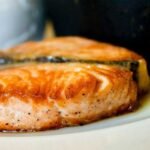
Foods to Avoid If You Have Irregular Heartbeat: How to Improve Your Diet? What Can’t You Eat if Your Heart Beats too Fast?
I believe many people have experienced an uncomfortable feeling in their heart, which is usually referred to as palpitations, and arrhythmia is one of the symptoms that causes palpitations. There are many causes of arrhythmia, and diet is a very common cause.
Choosing a healthy diet can protect cardiovascular function; however, if you still maintain the same eating habits if your heart is not feeling well, it may make your heart more painful. This article has sorted out 5 foods to avoid eating due to arrhythmia, and together we will protect your cardiovascular system and say no to heart disease!
5 foods to avoid eating if you have irregular heartbeat
1. Alcohol
When it comes to arrhythmias, the number one enemy that most often appears is alcohol. Numerous studies have reported that alcohol can cause atrial fibrillation (a symptom of an irregular heartbeat), causing patients to have abnormal pulse rates and difficulty breathing. Therefore, if you have symptoms of suspected arrhythmia, you should reduce your alcohol intake as soon as possible.

2.Caffeine (tea, coffee, energy drinks)
Caffeine, nicotine (cigarettes) and other stimulants can increase the heart’s beating rate and even cause serious arrhythmias. For patients who have been diagnosed with arrhythmias, many doctors will advise patients to avoid foods or beverages containing caffeine, such as tea, coffee, energy drinks, etc.

3.Foods high in saturated and trans fats
Eating too much trans fat and saturated fat can increase the risk of arrhythmia or other heart-related diseases. Foods such as butter, cheese, and red meat contain large amounts of saturated fat, while trans fat is commonly found in snacks (biscuits or potato chips) or various fried foods.

4.High sodium foods
Long-term excessive sodium intake from food can easily lead to high blood pressure and may further cause arrhythmia. Most processed and frozen foods contain large amounts of salt to facilitate preservation and enhance flavor. Therefore, you should try to eat fresh foods as much as possible, or choose foods with lower sodium content.

5.High sugar foods
Research reports indicate that patients with diabetes are 40% more likely to develop arrhythmia than the average person, mainly due to blood sugar levels. It is recommended to drink less sugary drinks and eat less sweets to reduce the risk of obesity and diabetes. If you are already a diabetic, you need to pay attention to overall sugar absorption and allocate portions of sugary foods accordingly to avoid excessive blood sugar fluctuations and aggravating the symptoms of diabetes or other complications.

How to improve arrhythmia with diet?
1.Eat more of these foods if you have irregular heartbeat
- vegetable
- whole grain food
- olive oil
- fruit
- beans
2.Eating more if you have irregular heartbeat is not harmful and has its own benefits to the body.
- fish
- chicken
- nut
- Egg
- dairy
3.Avoid eating if you have an irregular heartbeat
- manufactured food
- sugary food
- high fat food
- Refined starch
Common causes of arrhythmias: Processed, high-sugar foods
Certain foods can have a negative impact on the heart and significantly increase the risk of arrhythmia. For example, eating too much processed food, such as fast food, supermarket food, or drinks, biscuits and cakes containing too much sugar, will increase the risk. The risk of cardiovascular disease and other negative consequences for your health, such as being overweight, diabetes, cognitive decline or cancer. Here are 5 foods that you should try to minimize your intake of.
I believe many people have experienced an uncomfortable feeling in their heart, which is usually referred to as palpitations, and arrhythmia is one of the symptoms that causes palpitations. There are many causes of arrhythmia, and diet is a very common cause.












